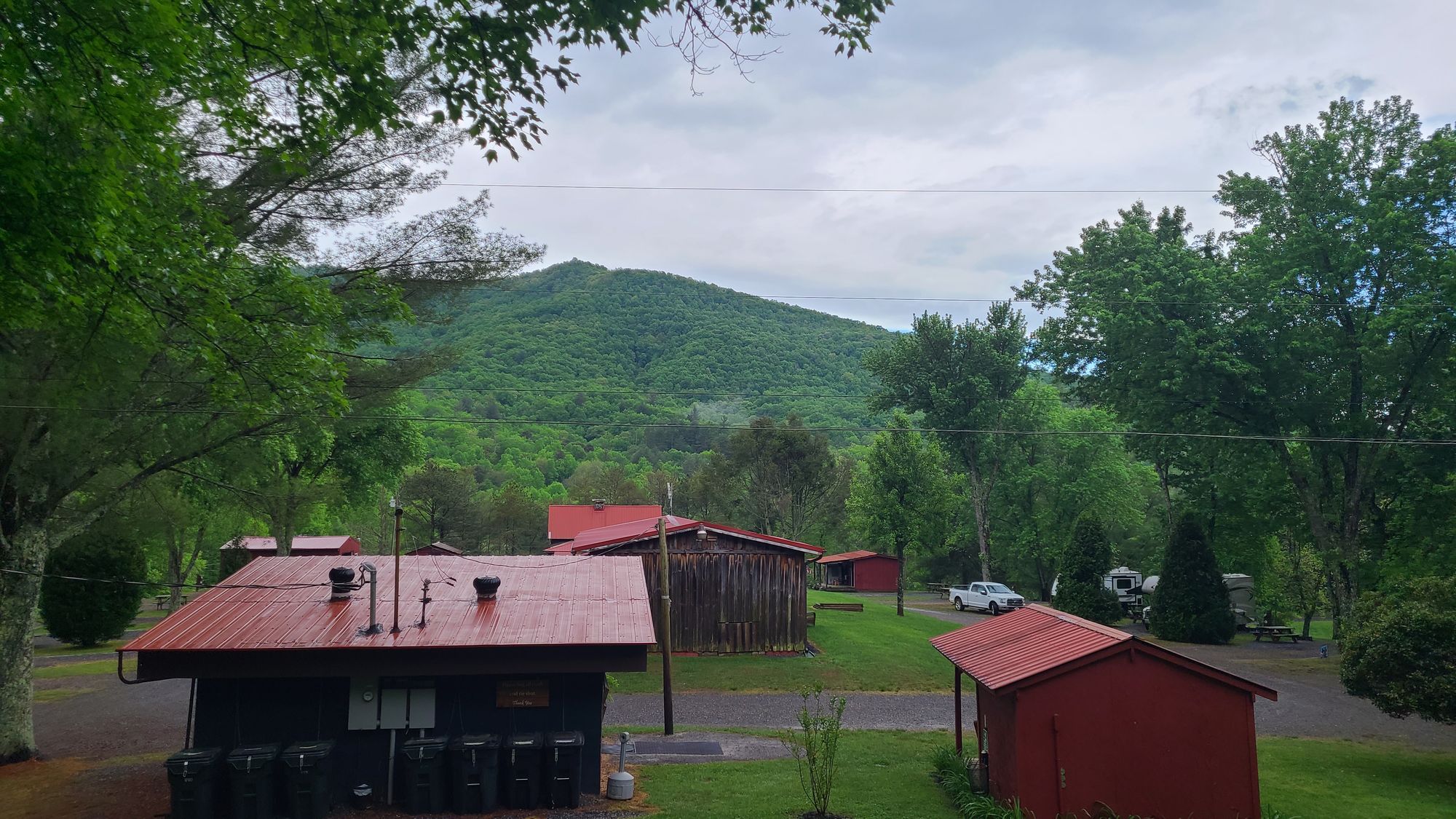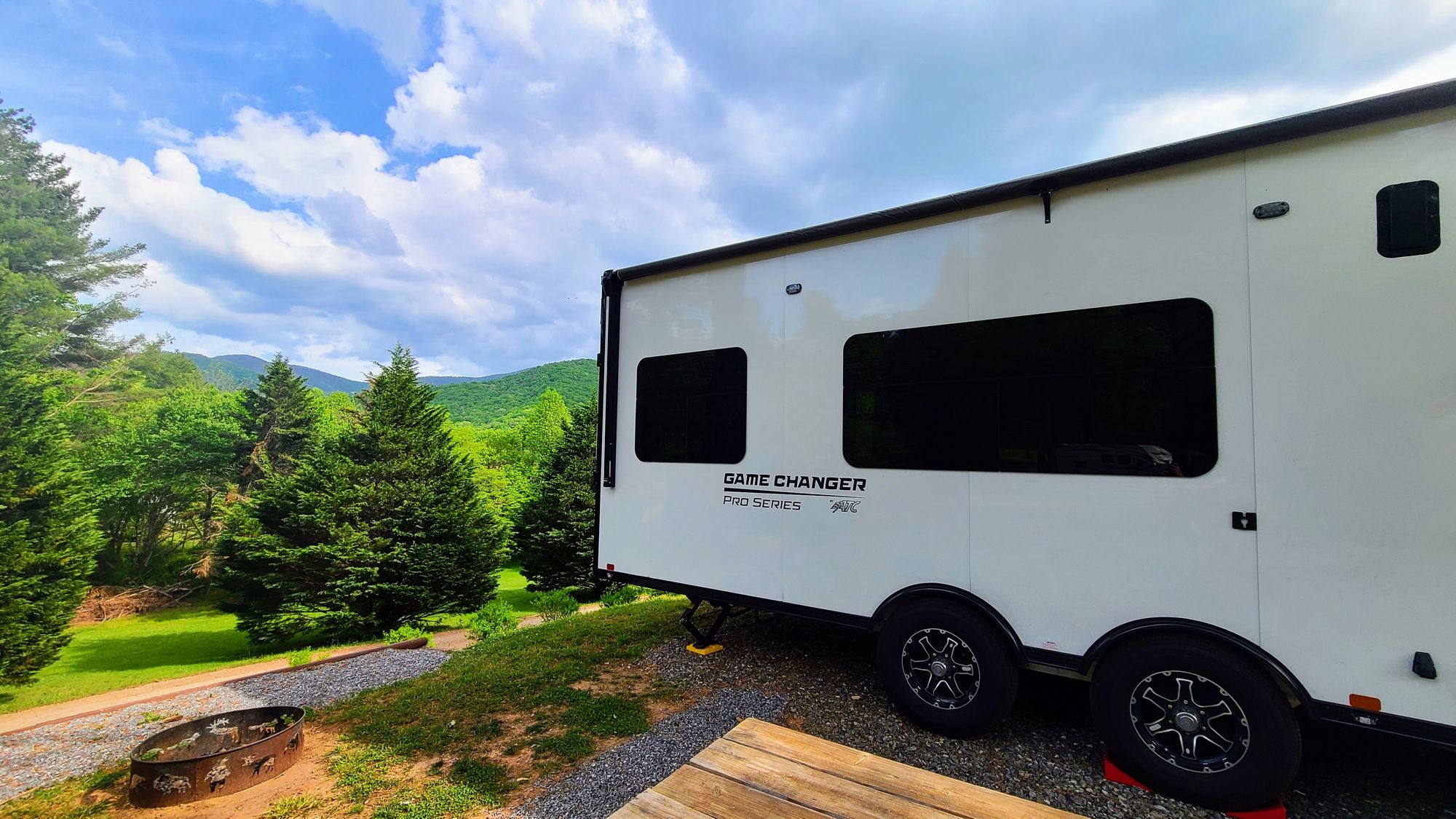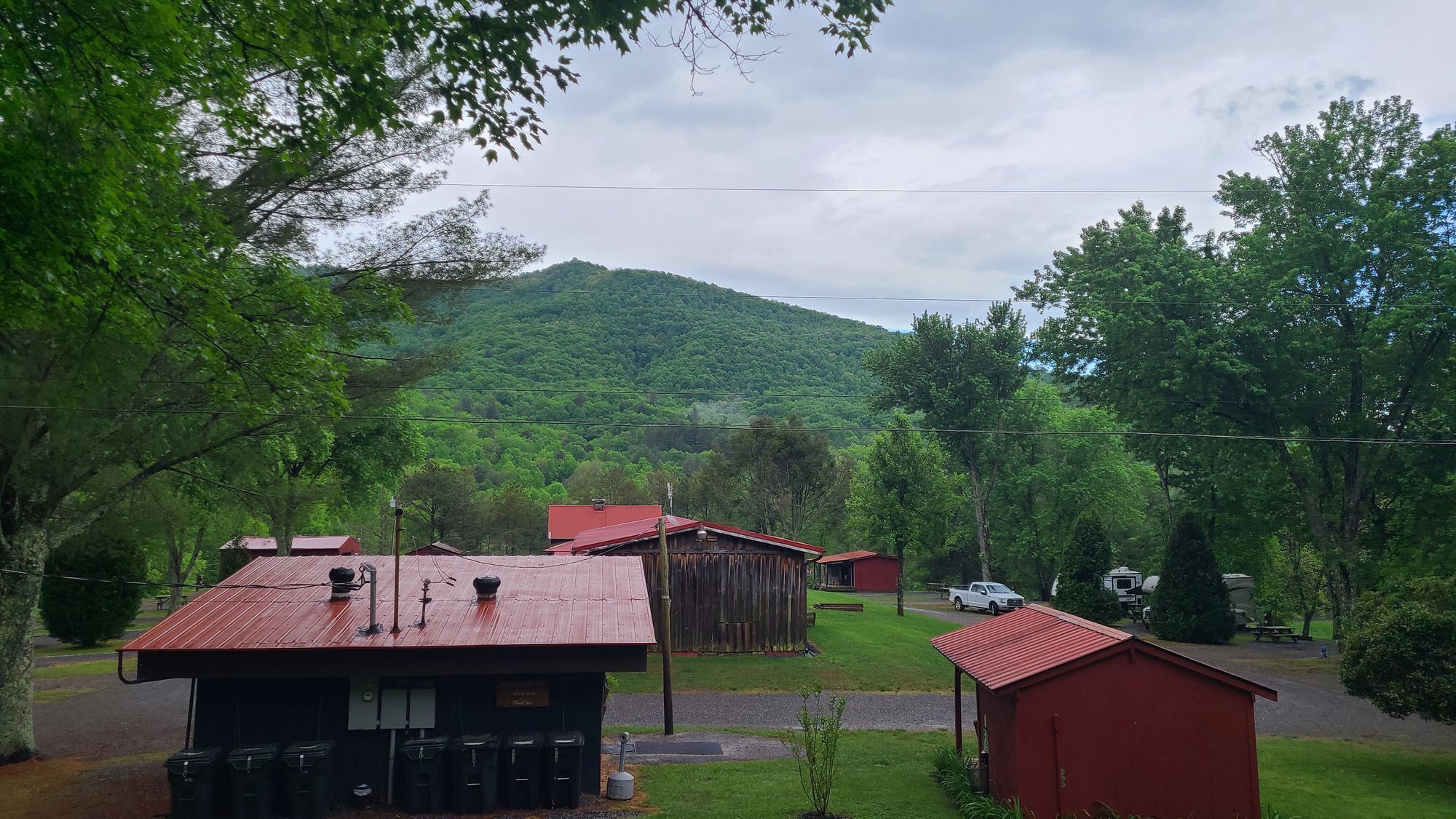Tornado Weather in Georgia! Steps for Being Prepared in Severe Weather Conditions.

We had been in Florida since the end of March, and by the time May rolled around, it was time to go. April had ushered in premature summer weather, and most days we were plagued by heat, humidity, thunderstorms, or far too often, all three. So, we bid farewell to Mom and Dad and made our way north. We gave ourselves extra time to get through Georgia and into the Blue Ridge Mountains, with plans to stay at a couple of Harvest Hosts on the way up. Our first travel day went really smoothly, and we covered about 450 miles, landing us around the Macon, GA area. We stopped at an orchard for an overnight, and the next day, decided that we wanted to just finish this leg of the trip and make it to our next campground. We called the owners and asked if we could arrive early, and they put us in a site overnight, as ours wouldn't be free until our actual check-in day. Fine by us, especially when we saw the view of our temporary site!

But more on the campground later. We were so happy to have made it to the mountains, the landscape that always feels a little like home for us. What we didn't know, however, was that our decision to arrive a day early turned out to be really lucky.
The following morning, we woke up to storms in the forecast. Nothing out of the ordinary, especially considering the Florida weather we had just experienced. We waited patiently for the pouring rain to stop and almost stayed dry as we moved to the campsite that would be our home for the next week.
After we settled in, we checked the forecast again, and saw an alert that we knew was coming sooner or later; we just didn't think it would be this soon.

This was the risk we took heading towards the Blue Ridge Valleys in the springtime. Tornado activity has been pretty intense lately, and the weather has spread to a much wider area than just Tornado Alley. We've been seeing reports of tornadic activity from the Florida Panhandle to Michigan, to the Carolinas, and up to Virginia. Georgia is certainly not spared. If we had stuck with our original plan to arrive a day later, we would have been driving mountain roads during stormy weather. We were glad to already be settled at our campground before these storms rolled in...even if that did mean a site change in the rain!
So what do RVers do when there is a tornado watch in their area? Surely, we need to have a game plan because we are not living in houses with foundations. Strong wind gusts and RVs don't get along very well. Thankfully, my love for meteorology (and fear, ahem, respect of nature) served us well, because we already had steps in place for extreme weather preparedness. Here are some of our best tips for handling severe weather as an RVer.
- Know your rig. Each RV is built differently, and some can handle stronger winds than others. Our trailer was put through the ringer a couple times last fall, before we even moved in, as it battled two Nor'Easters and up to 70mph winds. So our ballpark estimate is that our trailer could handle up to 70mph wind gusts. The direction of the wind also plays a factor here, as does the updraft of any winds (such as if the winds are actually those of a tornado or other storm cell).
- Map out a safe space. You don't want to rely too much on your rig's estimated ability to handle winds. Oftentimes, if strong winds are predicted, there are much safer places to go than inside your RV. We asked the campground owner where she recommends we take shelter, if the worst-case scenario occurs. In this case, as with many others, the bathhouse was the best option. Bathhouses are often built out of fairly strong materials and don't have a lot of windows, two factors that are important for safety in tornado weather. My conversation with the campground owner motivated her to send out an email to all the guests, explaining what to do if the weather takes a turn. Just goes to show that, by asking a simple question and thinking ahead of time, you can ensure your own safety and also inspire others to take the weather seriously.
- Check the radar. Seeing an alert is one thing, but weather radars are really helpful for tracking what the surrounding storms might do in the next several hours. There are tons of apps and websites that will show radars for storm activity, precipitation, wind, flooding, and more. If the radar is showing extreme weather close by or anything else really alarming, then it's best to make choices ahead of time than when the storm is already overhead. For instance, if the storm has a chance of being really destructive, do you feel safe at the campground, or would you rather drive into town and find a store or other building to hunker down in for a while? Just remember to keep track of the wind if you decide to go anywhere. You don't want to be driving in storms if you can help it, and you really don't want to be towing. So if you happen to be traveling in your RV during severe weather alerts, keep a close eye on the radar, wind speed and direction, and always know your nearby options for pulling off somewhere.
- Check the trees around your campsite. If your campsite has a lot of trees, take a glance at them and see if they look like they have integrity. Dead or dying trees are often too weak to survive wind, and too many RVs get crushed by falling trees in storms. Look for any exposed roots in loose soil, damage from animals or insects, or areas where the tree may have been burned. Also look up at the branches and see if there are leaves still growing on them, and if there are any precarious branches near your rig. If any trees seem suspicious, consider this when you're making the decision whether or not to remain in your rig if the wind gusts strengthen.
- Have an emergency bag packed. All four of us have go-bags packed and ready in case we need to evacuate at a moment's notice. That's right, even Lily and Tanner have their own bags. We carry the essentials, such as extra clothes, food, water bottles, meds for a few days, a few toiletries, and some survival tools such as flashlights, a glass-breaking hammer, and a first aid kit. We also have copies of our important documents in printed and digital formats.
- Set up alerts on your phone. Having radar apps is great, but make sure that you also get weather alerts sent to your phone. This will be set automatically for most smart phones, but if you travel a lot, your location might not be up-to-date. For us, because we had just arrived to the campground the day before, our GPS might be lagging, thinking we were still a couple hundred miles south. So we double checked our current location and also looked through our apps to see which ones had alert functions. One thing we also like to do is grab our walkie talkies that we use for parking our rig. They have a channel that's all weather alerts, so we can tune into it to get audio on the weather conditions. It's also nice to have the walkies on hand in case Anthony and I get split up and need to contact each other when there's no cell service (which there was not at this campground).
- Don't panic and use common sense. Now that the plan is set in place, it's basically a waiting game to see if anymore alerts come in. A tornado watch means that the storms are capable of producing tornado activity. a tornado warning means that a tornado - or cells capable of producing a tornado - have been found in your immediate area. This is usually when you'll get the alarm on your phone telling you to seek shelter. This is also when you don't want to panic. You've already gathered all your information, so now it's time to make what you feel is the safest choice.
Thankfully, our tornado watch expired and no activity occurred in our area. That same storm did produce a couple of tornadoes up in North Carolina, a couple hours north of where we were staying. As we continue our springtime mountain camping, we know that these types of storms are a real possibility, but we can't let that interfere with all the memories we're creating on the road. RV life can be dangerous at times, but it's a trade-off for all the beauty and adventure that this life gifts us.


